Hard Time hits Unity Bank
…As FG Set To Takeover Due To Dwindling Fortunes

The federal government through the Central Bank of Nigeria (CBN) is considering revoking the operating license of Unity Bank Plc over its failure to meet regulatory benchmarks, according to a report by BusinessLive.
The online financial website quoting inside sources said the regulator has been so worried about the poor performance of the bank for some years now which has made it unable to meet key regulatory requirements.
The CBN, it was gathered, may be left with no option than to withdraw the bank’s license and nationalize it to safeguard depositors’ funds.
Sources further disclosed that Unity Bank’s share capital has been gradually running into the negative territory.
However, it was learnt that some top influential figures in Nigeria are currently mounting pressure on the apex bank through the Presidency to drop plans to take over the bank whose board is chaired by Aminu Babangida, son of former Nigerian military president, General Ibrahim Babangida.
Former President Olusegun Obasanjo is also said to have interest in the lender as one of his daughters, Oluwafunsho Abiodun Obasanjo, is on its board.
“If the CBN makes good its plans, and it can secure the consent of President Mohammadu Buhari, the bank would be handed over to the Asset Management Corporation of Nigeria (AMCON) and a bridge bank would be formerly created in consultation with the Nigerian Deposit Insurance Corporation (NDIC) to assume the ownership of the assets, all deposit liabilities and some other liabilities of the bank,” one of the sources said.
In April, Unity Bank’s auditors, KPMG, raised a red flag over its ability to continue operations because its liabilities exceeded its assets, resulting in a negative capital adequacy ratio for the second consecutive year.
“A material uncertainty exists that may cast significant doubt about the bank’s ability to continue as a going concern,” KPMG said in a note accompanying the bank’s 2019 annual financial statements.

While the bank’s total assets stood at N445.95 billion at the end of June, its total liabilities were N724.59 billion during this period.
The fortunes of Unity Bank had been declining since 2016, posting N14.92 billion and N7.7 billion losses in 2017 and 2018 respectively, though it made some recoveries in 2019 when it declared N3.38 billion profit.
In the first half of this year, it made N1.03 billion post-tax profit, which was 7 per cent higher than it made in the same period in 2019, having grown its grossing revenue by 11 per cent to N22.86 billion during same period.
The bank has also made some progress in cutting down its impairment charges, which declined by 36.05 per cent to N314 million recorded in H1 2020 from N491 million in the same period last year.
Of concern to the CBN is Unity Bank spending 88.2 per cent of income to run its operations as cost-to-income ratio stood at 88.2 per cent in 2019, which was 3 per cent rise from 85.6 per cent it had in the previous year.
The bank’s loan-to-deposit ratio was 44.1 per cent as of June 2020, 20.9 per cent short of the 65 per cent benchmark set by the Central Bank.
Its shareholders’ fund declined by14.60 per cent to -N278.64 billion in H1 2020. Shareholders’ funds refer to the amount of equity in a company, which belongs to the shareholders.
Meanwhile, Agusto & Co. assigns a “Bb-” rating to Unity Bank, meaning that it is junk, which is below investment grade.
DaVoe Okorie, Head of Corporate Communications, Unity Bank Plc, could not respond to enquiries as at press time.
On September 22, 2018, the CBN intervened in ailing Skye Bank Plc and the operating licence of the bank was revoked to give way to Polaris Bank Limited.
It had earlier taken over Intercontinental Bank, Oceanic Bank, Spring Bank, Bank PHB and AfriBank and produced bridge banks from them








Leave a Reply